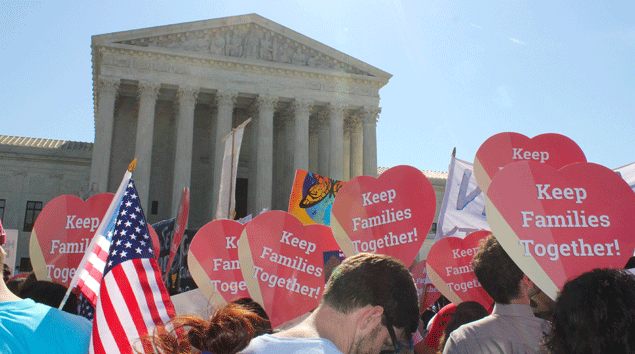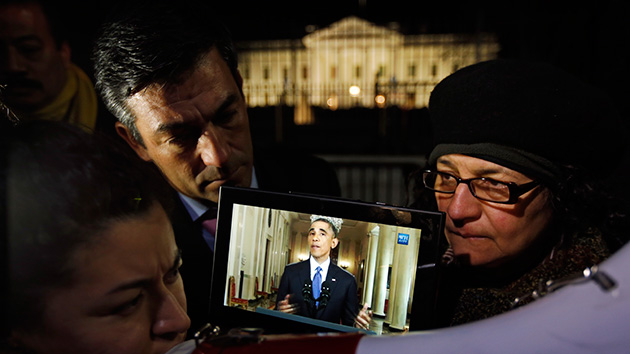
Pro-immigration protesters at the Supreme Court Monday<a href="https://www.dropbox.com/sh/f8moxwey0zidrag/AADY8ZMbFEwqj1JQIIf61P49a?dl=0&preview=fight-for-families-rally-21.jpg">Courtesy FWD.us
When the Supreme Court hears oral arguments in a critical case, the justices often provide hints in their questions about how they might rule. But after Monday’s arguments in United States v. Texas, a challenge by 26 states to President Barack Obama’s executive action on immigration, the only thing that seemed clear was that the court was in a massive bind, having been asked to settle a contentious political question that it was not keen to address.
There were few, if any, hints—and this probably doesn’t bode well for the president’s attempt to bring 4 million immigrants out of the shadows and allow them a foothold into the legal employment market. The questions from the justices showed a marked lack of consensus on all the key issues at play. And if the court ends up deadlocked with a 4-4 vote, the 5th Circuit Court of Appeals’ ruling against the administration will stand, and Obama’s immigration action will be eviscerated.
The case stems from a lawsuit filed in December 2014, a month after the Obama administration ordered immigration officials to defer the deportation of millions of law-abiding immigrants who had come to the country illegally but had children who were US citizens or legal permanent residents. The action, which was blocked by the lower court before it could be implemented, wouldn’t grant any immigrants legal status, but it would permit many of them to apply for legal work authorizations and the ability to participate in the Social Security system.
The state of Texas took the lead in challenging the order, and the principal hurdle for it has to do with standing. Texas must demonstrate that Obama’s policy actually harms the state. Texas argues that its injury is the result of the cost of providing subsidized driver’s licenses to immigrants. The state already provides such licenses to other, undocumented immigrants covered under previous deferral actions, but because of specific wording in Obama’s executive action, it would likely be required to extend the subsidy to the additional immigrants covered by the new policy. If it chose not to provide these licenses, it could face discrimination lawsuits. But Texas’ policy of subsidizing undocumented driver’s licenses is a voluntary one—it’s not mandated by the federal government. The state could just as easily decide to end this practice rather than pay for the extra licenses that might be necessary if Obama’s immigration policy were implemented. That’s why the administration argues Texas’ alleged injury is largely self-inflicted.
Much of Monday’s arguments revolved around this issue of standing. All eyes were on Chief Justice John Roberts Jr., who could serve as the swing vote in the case, given his skepticism toward claims of standing in earlier cases. Roberts argued in 2007 in Massachusetts v. EPA that Massachusetts had no standing in bringing a suit against the Environmental Protection Agency over greenhouse gas regulations, but his colleagues disagreed.
On Monday, though, he didn’t seem inclined to apply such scrutiny to Texas. Roberts quoted a comment Obama had made in 2012, when the president announced an expansion of deferred deportation rules that applied to children but said he didn’t think a president had the authority to make such a move for their parents. As Roberts pointed out, Obama at that time said that if he issued an order covering parents here illegally, “I would be ignoring the law in a way that I think would be very difficult to defend legally.” During the arguments, Roberts asked Solicitor General Donald Verrilli, “What was he talking about?” Verrilli responded that Obama had gotten another opinion and changed his mind.
Justice Samuel Alito, who in the past has resisted imposing limits on presidential power during Republican administrations, also indicated on Monday that he believed Texas had the right to bring the case. He instead spent much of his questioning fretting that Obama’s action may have given illegal immigrants new powers to file discrimination cases against their employers or potential employers.
Justice Sonia Sotomayor, the court’s only Latina justice* who is almost certain to back the Obama administration in this case, challenged the validity of the huge costs Texas claimed it would incur if Obama’s immigration order took effect. “Do we just accept at face value something that might—might not be true?” she asked, citing allegations that Texas had “made up” its numbers. She posited that perhaps Texas could simply let people stand in line longer at the DMV rather than expend more money to pay for the extra licenses.
The case poses a dilemma for the justices. If they grant Texas standing, they could face a tsunami of lawsuits from states any time a federal action might force a state to spend tax dollars. Verrilli told the justices that granting standing could do exactly what the country’s founders wanted to avoid: shift tremendous political power into the hands of a few unelected judges. None of the justices seem likely to want to be in the business of arbitrating political questions that become gridlocked in Washington.
It’s not just Republican-controlled states that could bring suits in this scenario. California looms large over the case. It could push hard for more progressive environmental regulation. Walter Dellinger, a law professor at Duke University and former White House counsel under President Bill Clinton, wrote in an amicus brief in the case that giving Texas standing “would not only inject the Court into this political maelstrom, but also the next one, and the next…[I]t would open wide a back door to federal court for States seeking resolution of a host of politically charged disputes.”
Roberts didn’t seem inclined to question Texas’ standing to bring the case. But if he wants to avoid opening these floodgates, he has a choice: hold his nose once again and side with the Obama administration, or find a way to thread the needle and settle the case without making a bigger mess than the one Congress has already left.
Correction: An earlier version of this article incorrectly stated that Sotomayor was a “child of immigrants.” Her parents were from Puerto Rico and thus US citizens.












